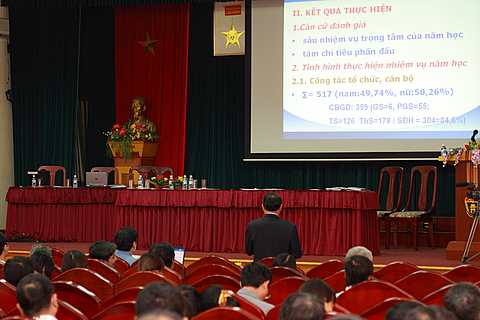The Faculty and Staff Conference for the 2008-2009 academic year of the University of Social Sciences and Humanities took place on October 25, 2008, with the participation of 221 delegates.

The Faculty and Staff Conference for the 2008-2009 academic year of the University of Social Sciences and Humanities took place on October 25, 2008, with the participation of 221 delegates.
The conference heard reports on the implementation of tasks during the 2007-2008 school year, financial reports, and discussed the direction and tasks for the next school year.
Here are some of the key achievements the school has accomplished during the past academic year:
 Regarding personnel organization, the University established the Department of Art Studies under the Faculty of Literature, the Department of Counseling Psychology under the Faculty of Psychology, the Center for Contemporary Religious Studies, the Center for Korean Language and Korean Studies directly under the University, established the Information Team, and completed the procedures for renaming the Department of Vietnamese Language and Literature and the Department of Journalism. Three documents concerning internal expenditure regulations, regulations on building and developing a team of leading scientific staff, and regulations on signing concurrent contracts were revised and promulgated. The University also successfully carried out staff recruitment, organized training courses for staff, and implemented policies and regulations for staff well.
Regarding personnel organization, the University established the Department of Art Studies under the Faculty of Literature, the Department of Counseling Psychology under the Faculty of Psychology, the Center for Contemporary Religious Studies, the Center for Korean Language and Korean Studies directly under the University, established the Information Team, and completed the procedures for renaming the Department of Vietnamese Language and Literature and the Department of Journalism. Three documents concerning internal expenditure regulations, regulations on building and developing a team of leading scientific staff, and regulations on signing concurrent contracts were revised and promulgated. The University also successfully carried out staff recruitment, organized training courses for staff, and implemented policies and regulations for staff well.
Regarding university training, students, and inspection, the university has performed well in student recruitment for all programs, officially applying the positive aspects of the credit-based training method to all regular training courses, and implementing the credit-based training program for the QH-2006-X and QH-2007-X cohorts. The work of compiling textbooks and lectures, and innovating teaching methods, has seen many positive changes. The policies and rights of students are ensured.
 Regarding postgraduate training and scientific research, the university successfully organized two rounds of postgraduate entrance examinations, implemented the roadmap for transitioning to a credit-based training method at the undergraduate level, continued to maintain postgraduate training partnerships with domestic institutions, and improved the quality of training through international collaborative programs, achieving international standards. In the 2007-2008 academic year, university staff published 16 textbooks and monographs, 105 reference books, and 504 articles in domestic and international journals. 10% of the university's students participated in scientific research, with one project winning second prize, two projects winning third prize, and three projects receiving honorable mentions at the ministerial level.
Regarding postgraduate training and scientific research, the university successfully organized two rounds of postgraduate entrance examinations, implemented the roadmap for transitioning to a credit-based training method at the undergraduate level, continued to maintain postgraduate training partnerships with domestic institutions, and improved the quality of training through international collaborative programs, achieving international standards. In the 2007-2008 academic year, university staff published 16 textbooks and monographs, 105 reference books, and 504 articles in domestic and international journals. 10% of the university's students participated in scientific research, with one project winning second prize, two projects winning third prize, and three projects receiving honorable mentions at the ministerial level.
Regarding international cooperation, the university's external relations activities continued to develop through maintaining and implementing cooperative relationships with over 100 partners, including universities, research institutes, and international organizations, and signing 19 new cooperation agreements. International cooperation projects continued to be implemented effectively, and the exchange of scholars and students with international universities was strengthened.
 For the 2008-2009 academic year, the school identified the following main development directions:
For the 2008-2009 academic year, the school identified the following main development directions:
- Accelerate the development of faculty members with doctoral degrees;
- Implement credit-based training for the QH-2007-X and QH-2008-X cohorts, extensively apply the positive aspects of credit-based training to the remaining cohorts, implement training in one major and two specializations to achieve international standards, and diversify training types to meet social needs;
- Develop and implement several major interdisciplinary projects linked to training and the socio-economic development requirements of the capital and the country;
- Expand international cooperation programs in training and scientific research, especially joint postgraduate training programs;
- Continue implementing administrative reforms;
- Intensify the implementation of the "Studying and Following the Moral Example of Ho Chi Minh" campaign, phase 2, and the "Two No's" campaign in education, building a cultural and high-quality school environment to ensure the school's rapid development and international integration.
Author:thanhha
Newer news
Older news